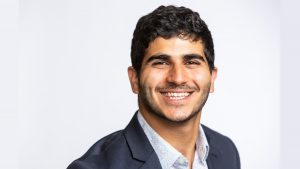Justin Hadad ’21 majored in economics and applied physics and minored in Latin. At Carolina, he was a Morehead-Cain Scholar, a member of Phi Beta Kappa, an Honors Carolina laureate and an entrepreneur.

Carolina alumnus Justin Hadad has received the prestigious Rhodes Scholarship, which funds study at the University of Oxford in England.
Hadad ’21 majored in economics and applied physics and minored in Latin. At Carolina, he was a Morehead-Cain Scholar, a member of Phi Beta Kappa, an Honors Carolina laureate and an entrepreneur.
“Winning a Rhodes Scholarship is a remarkable achievement. Earning this honor is a testament to Justin’s hard work and determination while at Carolina,” said Chancellor Kevin M. Guskiewicz. “I congratulate Justin on this opportunity, and I look forward to seeing what he accomplishes at Oxford and beyond, knowing he will be an outstanding ambassador for Carolina.”
Hadad is Carolina’s 53rd Rhodes Scholar and the second to earn the award this year, joining senior Takhona Hlatshwako, who received the scholarship in October. The Rhodes Trust is expected to announce more members of its Class of 2022 in the coming days.
Road to the Rhodes
The Hadad family has a long-running tradition of taking challenges head-on and finding their own solutions. For Justin’s ancestors living in civil strife in the Middle East, that meant seeking a new life in Trinidad. And when his parents were faced with unrest in Trinidad in 1990, they packed up their life and found a new home in Ohio.
“It’s all about finding solutions to the problem they had, and it didn’t quite stop with the easy solution. They went to the hardest solution possible, which is leaving their homeland and finding a new place to live,” Hadad said. “I’ve taken that tenet and built my life around it — finding problems that people face and building solutions around those problems.”
And he did just that at Carolina by tapping into his passions for both STEM and economics. As a Tar Heel, he utilized technology to create new systems that make people’s lives better — from solving a common business issue to addressing immigrant allocation reform.
In Chapel Hill, he created SplitTime (formerly Wage Technologies), a scheduling software that merges machine learning and economic theory to help businesses manage employees’ shifts. The next year he co-founded UNCUT, a storytelling platform that highlights student-athletes lives off the field to help student-athletes address their mental health.
“I’ve learned that I’m driven not by some kind of personal desire to work on a certain project. I’ve learned that I see a problem, and I want to work on it,” he said. “I witnessed a problem in the mental health space for student-athletes, and I worked on a solution to it. I witnessed a problem in the allocation of shifts in retail and restaurant businesses, so I designed software that could fix those problems.”
Nationally, Hadad has helped Silicon Valley companies Carbon and Zoomo design algorithms to analyze 3D printed parts and develop infrastructures for theft recovery. He also served as a research fellow for Louisville Forward, creating new financial policies for immigrants in the Kentucky city.
After graduating, he worked at a real-time simulation software company, Unity, where he designed software for low-tech industries.
He is now planning to take his problem-solving to the next level as a Rhodes Scholar. He hopes to bring all of his experiences together to help millions of people by using economic resource allocation algorithms to place refugees in environments where they’re best suited to thrive. As he pursues a master’s degree in economics at Oxford University, he will have the opportunity to gain the tools and expertise to do just that from Alex Teytelboym, the deputy director of economics of sustainability in the Oxford Martin School.
“There currently are as many as 20 million refugees in need of homes,” Hadad said. “Economics provides a framework for putting these refugees in places where they can find a new life and new employment. The No. 1 person working on that algorithm is at Oxford. I love everything [Teytelboym] is doing, and I want to learn under him for as long as I can.”
With mentorship from Teytelboym and his interdisciplinary cohort of fellow Rhodes Scholars, Hadad believes the experience at Oxford University will prepare him to continue his passion for improving lives, but this time on a global scale.
“This would be the next step that I need to serve people on a broader scope,” he said. “I’m excited to take that next step because I’m confident I can be successful in that realm.”
By University Communications
